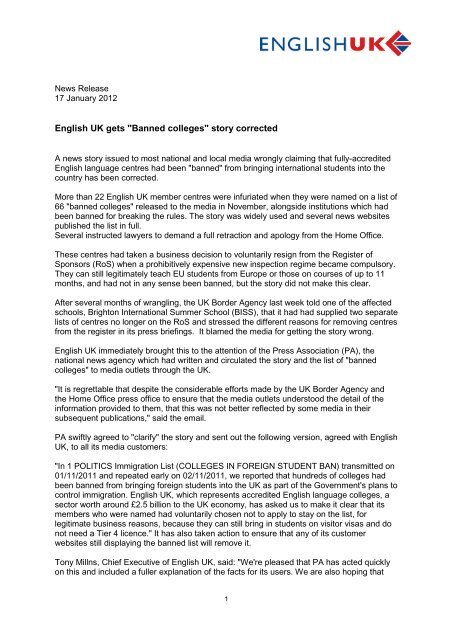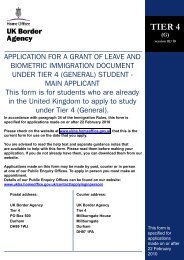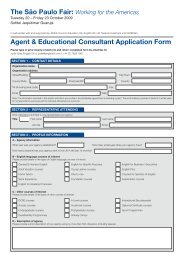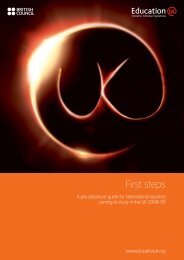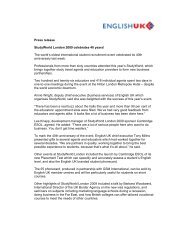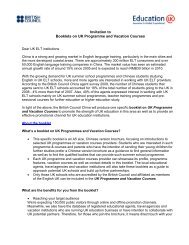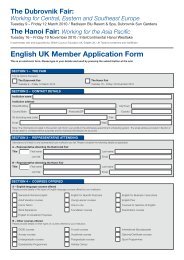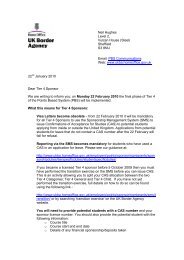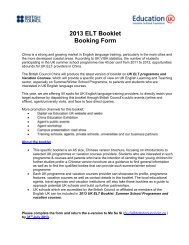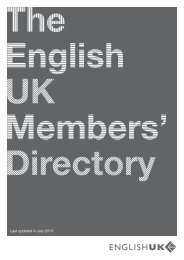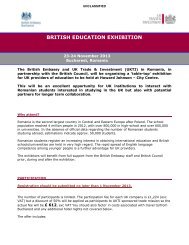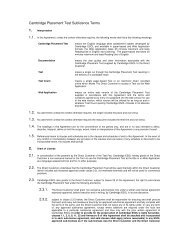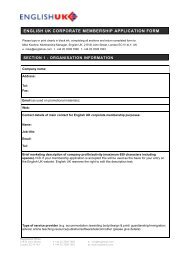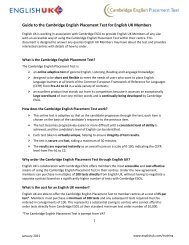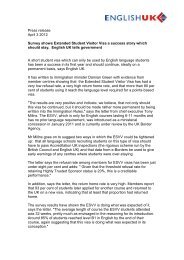Download this press release as a PDF document - English UK
Download this press release as a PDF document - English UK
Download this press release as a PDF document - English UK
Create successful ePaper yourself
Turn your PDF publications into a flip-book with our unique Google optimized e-Paper software.
News Rele<strong>as</strong>e<br />
17 January 2012<br />
<strong>English</strong> <strong>UK</strong> gets "Banned colleges" story corrected<br />
A news story issued to most national and local media wrongly claiming that fully-accredited<br />
<strong>English</strong> language centres had been "banned" from bringing international students into the<br />
country h<strong>as</strong> been corrected.<br />
More than 22 <strong>English</strong> <strong>UK</strong> member centres were infuriated when they were named on a list of<br />
66 "banned colleges" <strong>rele<strong>as</strong>e</strong>d to the media in November, alongside institutions which had<br />
been banned for breaking the rules. The story w<strong>as</strong> widely used and several news websites<br />
published the list in full.<br />
Several instructed lawyers to demand a full retraction and apology from the Home Office.<br />
These centres had taken a business decision to voluntarily resign from the Register of<br />
Sponsors (RoS) when a prohibitively expensive new inspection regime became compulsory.<br />
They can still legitimately teach EU students from Europe or those on courses of up to 11<br />
months, and had not in any sense been banned, but the story did not make <strong>this</strong> clear.<br />
After several months of wrangling, the <strong>UK</strong> Border Agency l<strong>as</strong>t week told one of the affected<br />
schools, Brighton International Summer School (BISS), that it had had supplied two separate<br />
lists of centres no longer on the RoS and stressed the different re<strong>as</strong>ons for removing centres<br />
from the register in its <strong>press</strong> briefings. It blamed the media for getting the story wrong.<br />
<strong>English</strong> <strong>UK</strong> immediately brought <strong>this</strong> to the attention of the Press Association (PA), the<br />
national news agency which had written and circulated the story and the list of "banned<br />
colleges" to media outlets through the <strong>UK</strong>.<br />
"It is regrettable that despite the considerable efforts made by the <strong>UK</strong> Border Agency and<br />
the Home Office <strong>press</strong> office to ensure that the media outlets understood the detail of the<br />
information provided to them, that <strong>this</strong> w<strong>as</strong> not better reflected by some media in their<br />
subsequent publications," said the email.<br />
PA swiftly agreed to "clarify" the story and sent out the following version, agreed with <strong>English</strong><br />
<strong>UK</strong>, to all its media customers:<br />
"In 1 POLITICS Immigration List (COLLEGES IN FOREIGN STUDENT BAN) transmitted on<br />
01/11/2011 and repeated early on 02/11/2011, we reported that hundreds of colleges had<br />
been banned from bringing foreign students into the <strong>UK</strong> <strong>as</strong> part of the Government's plans to<br />
control immigration. <strong>English</strong> <strong>UK</strong>, which represents accredited <strong>English</strong> language colleges, a<br />
sector worth around £2.5 billion to the <strong>UK</strong> economy, h<strong>as</strong> <strong>as</strong>ked us to make it clear that its<br />
members who were named had voluntarily chosen not to apply to stay on the list, for<br />
legitimate business re<strong>as</strong>ons, because they can still bring in students on visitor vis<strong>as</strong> and do<br />
not need a Tier 4 licence." It h<strong>as</strong> also taken action to ensure that any of its customer<br />
websites still displaying the banned list will remove it.<br />
Tony Millns, Chief Executive of <strong>English</strong> <strong>UK</strong>, said: "We're ple<strong>as</strong>ed that PA h<strong>as</strong> acted quickly<br />
on <strong>this</strong> and included a fuller explanation of the facts for its users. We are also hoping that<br />
1
everyone involved, including the <strong>UK</strong>BA <strong>press</strong> team, PA and the wider media will now have a<br />
better understanding of the issues involved so that similar, potentially defamatory mistakes,<br />
will not be made on future occ<strong>as</strong>ions."<br />
In its email to BISS, the <strong>UK</strong>BA's Litigation and Correspondence Team claimed it had even<br />
contacted a national broadc<strong>as</strong>ter which ran the list on its website under the headline<br />
"banned" to reiterate that <strong>this</strong> w<strong>as</strong> inaccurate and should be amended.<br />
It explained: "In telephone briefings with journalists the day before the publication, the Home<br />
Office <strong>press</strong> office made clear that revocation of a licence did not necessarily indicate noncompliance<br />
or poor educational standards. While explaining various figures within the <strong>press</strong><br />
notice, it w<strong>as</strong> stressed to journalists that education providers may have decided for their own<br />
re<strong>as</strong>ons not to apply - for example, because they no longer were looking to attract overse<strong>as</strong><br />
students, or had decided to focus on the extended Student Visitor Visa route.<br />
"Two lists of those sponsors whose licenses had been revoked were emailed separately to<br />
the Press Association who ex<strong>press</strong>ed interest in regionalising the story - one list w<strong>as</strong> of the<br />
revocations due to non-compliance of sponsor duties and the other of revocations further to<br />
the new educational oversight and Highly Trusted Sponsor (HTS) arrangements. Before<br />
these lists were sent to the Press Association, the Home Office <strong>press</strong> office explained over<br />
the telephone the differences between these two lists and the various re<strong>as</strong>ons<br />
why a college might appear on them."<br />
Notes to Editors<br />
1. <strong>English</strong> <strong>UK</strong> is the world’s leading language teaching <strong>as</strong>sociation, with more than 450<br />
accredited centres in membership. It covers university and further education college<br />
language departments, international study centres in independent schools,<br />
educational trusts and charities, and private sector colleges. <strong>English</strong> <strong>UK</strong> is a <strong>UK</strong><br />
registered charity (www.englishuk.com).<br />
2. All <strong>English</strong> <strong>UK</strong> members must be accredited by the quality <strong>as</strong>surance scheme<br />
Accreditation <strong>UK</strong>, which is run by the British Council in partnership with <strong>English</strong> <strong>UK</strong>.<br />
It w<strong>as</strong> the first scheme in the world specifically designed to inspect teaching in<br />
language schools. Private centres applying to join the Register of Sponsors autumn<br />
2011 were forced to apply for Educational Oversight from Government-approved<br />
providers, for which the fees are generally four times higher. Neither Accreditation<br />
<strong>UK</strong> nor the new EO inspection looks at compliance with visa regulations, which is<br />
the responsibility of <strong>UK</strong>BA.<br />
3. Students who come to the <strong>UK</strong> to learn or improve their <strong>English</strong> contribute about £2.5<br />
billion to the <strong>UK</strong> economy in course fees, accommodation and general spending.<br />
Many students go on from <strong>English</strong> language courses to <strong>UK</strong> degrees or professional<br />
qualifications. There are long-term affinity benefits to Britain <strong>as</strong> well, since many<br />
students go on to be opinion-leaders and senior figures in their own countries.<br />
4. For further comment ple<strong>as</strong>e contact Tony Millns on 020 7608 7960.<br />
<strong>English</strong> <strong>UK</strong> Ltd<br />
219 St John Street<br />
London<br />
EC1V 4LY<br />
w: www.englishuk.com<br />
e: info@englishuk.com<br />
2


